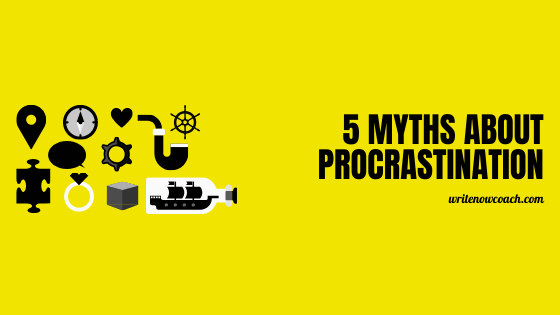Five Myths About Procrastination
February 25, 2020
Note From Rochelle
Dear Writers,
When my son was 12, I asked him to test out my newsletter’s sign up feature. He did. And because he’s kind, he hasn’t unsubscribed yet—though I doubt he reads the newsletter. Sam, if you’re reading this: Happy Birthday!
Today’s tip talks about one of my favorite topics: How to Overcome Procrastination. And if you want more support, sign up for my class on the topic, Procrastination Proof Your Writing Life.
Enjoy!
Rochelle

Five Myths About Procrastination
by Rochelle Melander
Have you struggled with procrastination?
Maybe you need to create consistent content for your business, but you put off writing or posting it. You’d rather clean the house.
You’ve always dreamed of writing a book, but even though you’ve thought about the cover and dreamed up the content, you can’t seem to get around to doing the writing.
Maybe you have a poem or two on the computer, but you never get around to submitting them.
Perhaps you think, I will do it:
- When I have more time or a big block of time.
- When I know more about the topic.
- When I am inspired to sit down and write.
- When I’ve achieved x, y, or z.
- When it gets closer to the deadline.
This is procrastination. We delay the task we want to or have to do in favor of doing less important work.
Procrastination Myths
Many of us have false beliefs about procrastination that get in the way of being able to solve the problem.
PROCRASTINATION MYTH #1:
Procrastinators cannot manage their time. They’re lazy.
Fact. People who procrastinate are practicing an avoidance strategy. And most procrastinators delay work in one or two areas of their life only, not all of them. They’re perfectly able to do the work in other areas of their lives.
PROCRASTINATION MYTH #2:
All procrastination is bad
Fact. According to Tim Pychyl, director of the Procrastination Research Group at Carleton University, “All procrastination is delay, but not all delay is procrastination.” Sometimes delay can be helpful. You may be managing your schedule so that you work at the optimum time. Or you delay turning in assignment so that you have more time to polish your work. Precrastinators sometimes finish an assignment too soon, before they have allowed the idea to percolate.
PROCRASTINATION MYTH #3:
People work best under pressure.
Fact. No one works best under pressure. But it does give you a good excuse. If it does not go well, you can always say, “I didn’t have time to prepare.”
PROCRASTINATION MYTH #4:
Everyone has a procrastination problem.
Fact: Only about 1 in 5 people or 20 percent of us are chronic procrastinators. The rest of us might procrastinate on a few things, but we get most of our work done on time.
PROCRASTINATION MYTH #5:
Procrastination is a trait.
Fact. Procrastination is learned behavior. Joseph Ferrari, a procrastination researcher from DePaul University, says that nurture has a lot to do with it. Parents who are cold and demanding often have children who procrastinate in reaction to this.
Going Deeper: Breaking the Procrastination Habit
Many people think about their habit of procrastination as a trait, something they’ve struggled with since childhood. But procrastination is a coping mechanism or a habit. We use it as a way to avoid difficult feelings.
Why do we procrastinate?
- We procrastinate to get out of scary situations.
- We put off finishing stories, poems, and presentations so that we can avoid negative judgments.
- We procrastinate because we have trouble making a decision.
Procrastination is a habit we developed, often as children or teens. We develop this habit as a reaction to something that we experienced. We use procrastination to:
- Cope with fear
- Resist authority figures
- Deal with perfectionism
To overcome procrastination, we need to connect with the feelings that are creating the block. If you struggle with procrastination, consider:
- When it comes to this habit, what stories are telling yourself?
- What beliefs do you have about your procrastination habit?
- Are they true?
Once we know why we procrastinate, we can work through it. We can overcome the emotional beliefs that get in the way of our getting stuff done.
That’s the hard part.
Once we know the why and have worked through it, then we can find tools to help us manage time and overcome procrastination.
Try This: Fun Framing!
One of the best tools I have found is called, Fun Framing. In the book Super Better, Jane McGonigal defines the tool like this, “Fun framing is what happens when you decide to do something for the pure pleasure, excitement, or enjoyment of it.”
The idea of fun framing came about when researchers Joseph Ferrari and Dianne M. Tice from DePaul University investigated why people procrastinate. The invited participants to either take a math test or play a math game.
All of the participants were given an hour to prepare by practicing the problems they’d need to solve on the math test or game. And the people who were preparing to play a game were much less likely to procrastinate.
What does this mean for you? Basically, people are more likely to do activities that they perceive as fun. So it’s helpful to “fun frame” the activities you tend to procrastinate.
What might that look like?
- Make a game out of the task—race against the clock or a friend.
- Add a fun element. If you have a boring piece to edit or a tedious research task, play music while you work or treat yourself to a favorite beverage.
- Invite a friend to work with you.
In the end, it’s how you approach an activity that matters. If you can frame the activity as fun, then you’ll be more likely to get it done.
If you want more help on overcoming procrastination, come to my class:
















Most helpful. Thanks.